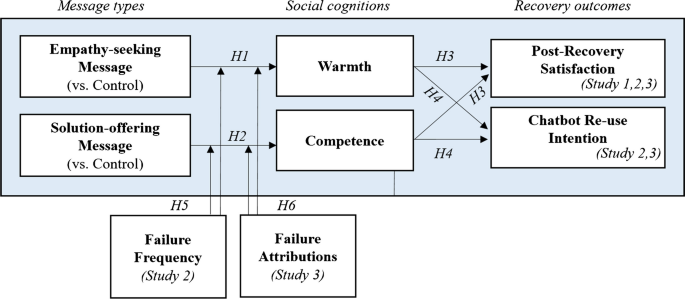寻求同情还是提出解决方案?聊天机器人消息对服务故障恢复的影响
IF 7.1
3区 管理学
Q1 BUSINESS
引用次数: 0
摘要
聊天机器人作为一种重要的会话代理形式,越来越多地被用作数字平台和电子市场上客户与公司互动的用户界面,但它们往往无法对用户的请求做出适当的响应。反过来,个人不满意并远离聊天机器人,这损害了聊天机器人的成功实施,最终损害了公司的服务绩效。基于刻板印象内容模型,本文探讨了两种普遍可用的故障恢复消息作为保持用户恢复后满意度和聊天机器人重用意图的策略的影响。三个实验结果表明,聊天机器人恢复信息对恢复反应有积极的影响,这种影响是由不同的社会认知介导的。特别是,以解决方案为导向的信息会引起更强的能力评价,而寻求共情的信息会导致更强的温暖评价。对其中一种消息类型的偏好取决于故障归属和故障频率。这项研究为聊天机器人技术开发者和营销人员提供了有意义的见解,他们希望以经济有效的方式了解和改善数字会话代理的客户体验。本文章由计算机程序翻译,如有差异,请以英文原文为准。

Seeking empathy or suggesting a solution? Effects of chatbot messages on service failure recovery
Abstract Chatbots as prominent form of conversational agents are increasingly implemented as a user interface for digital customer-firm interactions on digital platforms and electronic markets, but they often fail to deliver suitable responses to user requests. In turn, individuals are left dissatisfied and turn away from chatbots, which harms successful chatbot implementation and ultimately firm’s service performance. Based on the stereotype content model, this paper explores the impact of two universally usable failure recovery messages as a strategy to preserve users’ post-recovery satisfaction and chatbot re-use intentions. Results of three experiments show that chatbot recovery messages have a positive effect on recovery responses, mediated by different elicited social cognitions. In particular, a solution-oriented message elicits stronger competence evaluations, whereas an empathy-seeking message leads to stronger warmth evaluations. The preference for one of these message types over the other depends on failure attribution and failure frequency. This study provides meaningful insights for chatbot technology developers and marketers seeking to understand and improve customer experience with digital conversational agents in a cost-effective way.
求助全文
通过发布文献求助,成功后即可免费获取论文全文。
去求助
来源期刊

Electronic Markets
Multiple-
CiteScore
14.80
自引率
15.30%
发文量
85
期刊介绍:
Electronic Markets (EM) stands as a premier academic journal providing a dynamic platform for research into various forms of networked business. Recognizing the pivotal role of information and communication technology (ICT), EM delves into how ICT transforms the interactions between organizations and customers across diverse domains such as social networks, electronic commerce, supply chain management, and customer relationship management.
Electronic markets, in essence, encompass the realms of networked business where multiple suppliers and customers engage in economic transactions within single or multiple tiers of economic value chains. This broad concept encompasses various forms, including allocation platforms with dynamic price discovery mechanisms, fostering atomistic relationships. Notable examples originate from financial markets (e.g., CBOT, XETRA) and energy markets (e.g., EEX, ICE). Join us in exploring the multifaceted landscape of electronic markets and their transformative impact on business interactions and dynamics.
 求助内容:
求助内容: 应助结果提醒方式:
应助结果提醒方式:


